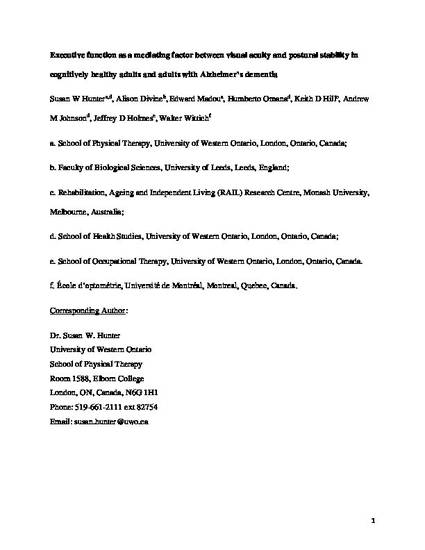
BACKGROUND: Falls in older adults, notably those with Alzheimer's dementia (AD), are prevalent. Vision and balance impairments are prominent falls risk factors in older adults. However, recent literature in the cognitively impaired suggests that executive function (EF) is important for falls risk assessments. The study objectives were to: 1) to compare balance among people with AD, healthy older adults (OA), and healthy young adults (YA) and 2) to quantify the interaction of visual acuity and EF on postural stability.
METHODS: We recruited 165 individuals (51 YA, 48 OA, and 66 AD). Trail Making Tests (A and B) quantified EF and the Colenbrander mixed contrast chart measured high and low contrast visual acuity. Accelerometers recorded postural sway during the Modified Test for Sensory Integration. A two-way repeated measures ANOVA examined postural sway differences across groups. Mediation analysis quantified the association of EF in the relationship between contrast sensitivity and postural sway.
RESULTS: Significant EF and visual acuity between-group differences were observed (p < 0.001). For postural sway, a significant interaction existed between group and balance condition (p < 0.001). In general, EF was a significant mediator between visual acuity and postural sway. Visual acuity, EF and postural sway was worse with increased age, particularly in the AD group.
CONCLUSIONS: Mediation analysis revealed that individuals with poorer visual acuity had poorer EF, and those with poorer executive function had poorer balance control. These results highlight the importance of assessing not only vision and balance but also EF, especially in older individuals living with AD.
Available at: http://works.bepress.com/andrewjohnson/79/
